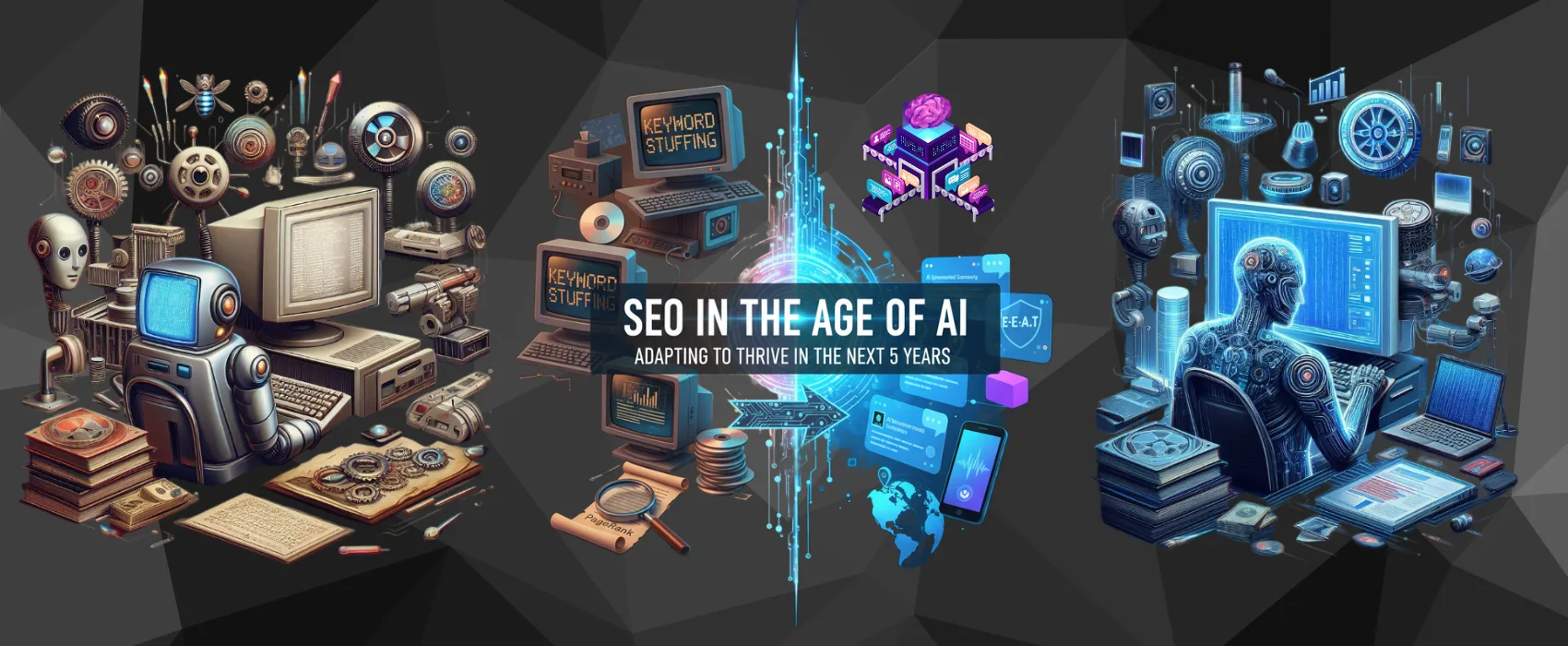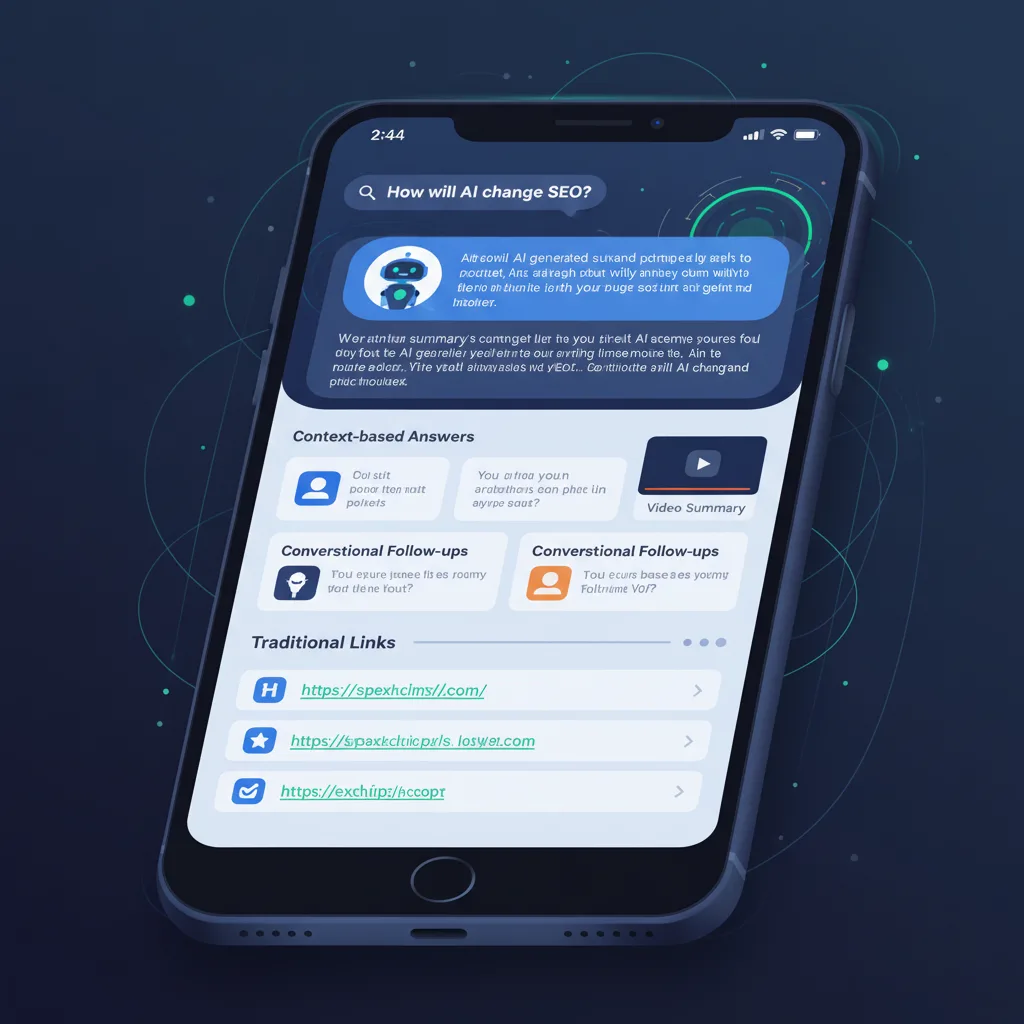

For those who remember the early SEO, keyword stuffing, endless directory submissions and nervously waiting for PageRank updates, the question “Is SEO dying?” feels like an old friend. Every major shift, from social media to voice search to mobile-first indexing, has sparked predictions of SEO’s demise. Yet here we are, still optimizing, still competing, still evolving.
Now, with artificial intelligence rapidly reshaping the digital landscape, the question returns with new urgency: Will SEO survive the next five years in an AI-driven world? My answer: Absolutely. But its form will be radically different.
The AI Tsunami: How Search and Content Are Being Transformed
AI is no longer a futuristic concept, it’s already embedded in how people discover, consume and trust information online. From search engines to content creation tools, AI is fundamentally reshaping the digital experience.
From Links to Conversations
Content Creation: Quantity vs. Quality
User Behavior: Beyond Keywords


Traditional search engines once revolved around a simple list of “ten blue links.” Today, AI-driven platforms like Google’s Search Generative Experience (SGE) and Bing’s ChatGPT-powered search are shifting toward interactive, conversational results. Instead of static snippets, users now receive AI-generated summaries, context-aware recommendations and dialogue-style answers. This shift means SEO isn’t only about ranking a page, it’s about ensuring your content is optimized to be referenced within these AI-generated responses.


AI tools such as ChatGPT, Gemini and Claude have made content creation accessible to everyone. While this democratization allows faster production, it also floods the web with repetitive and generic material. Search engines are responding by refining their algorithms to reward content that demonstrates authentic expertise, originality and trustworthiness. Businesses that focus on quality over quantity, such as publishing data-backed insights, real case studies and thought leadership will continue to stand out in AI-curated search results.


The way users search has evolved far beyond typing short keyword phrases. Today, people interact with voice assistants like Siri, Alexa and Google Assistant, or even conversational AIs directly. Queries are becoming longer, more natural and more intent-driven. This evolution means SEO must now account for context and conversational phrasing, not just exact keyword matches. To remain competitive, businesses should optimize for search intent, question-based queries and natural language content that mirrors how users actually speak.
Why SEO’s Core Value Endures
Despite rapid AI-driven changes, SEO remains indispensable. The purpose of SEO has always been to connect users with solutions and that purpose hasn’t changed. What’s shifting is how those solutions are discovered and prioritized.
The Enduring Human Need for Discovery
As long as people seek information, products or services, discoverability will always matter. AI may alter how results are presented, but businesses will still need strategies to ensure they are visible on the platforms people use. Instead of focusing only on keyword rankings, modern SEO must prioritize visibility across AI-driven discovery systems, voice search and generative summaries.
Trust & Authority: The Human Advantage
While AI can generate text, it cannot replicate the depth of real-world experience or the credibility earned over years of expertise. Search engines increasingly rely on E-E-A-T to filter out low-quality, AI-generated noise. Content backed by genuine expertise, whether through industry case studies, author credentials or strong brand recognition will carry more weight in an AI-powered search environment.


What is E-E-A-T?
E-E-A-T stands for Experience, Expertise, Authoritativeness, and Trustworthiness, a framework Google uses to evaluate the quality of online content. It’s not a single ranking factor, but it strongly influences how search engines decide which content deserves visibility.
- Experience → Content backed by real-life involvement or firsthand knowledge. For example, a cafe owner sharing insights about running a coffee shop demonstrates lived experience.
- Expertise → The depth of knowledge the creator brings to the topic. A certified nutritionist writing about diet, or an SEO veteran explaining algorithms, signals expertise.
- Authoritativeness → The credibility of the creator or brand. Being recognized by peers, cited by other reputable sites, or building a trusted brand presence all strengthen authority.
- Trustworthiness → The reliability and integrity of the content. This includes accuracy, citing reliable sources, transparent authorship, and a secure, user-friendly website.
In the age of AI-generated content, E-E-A-T acts as a filter, helping search engines highlight content that is authentic, credible, and rooted in human expertise.
Technical SEO: The Foundation That Never Crumbles
No matter how advanced AI becomes, websites still need to function properly at their core. A site with broken links, poor speed, or weak mobile optimization will struggle to perform in search results. Technical SEO, covering site architecture, crawlability, structured data and performance optimization remains the unshakable foundation of digital visibility. Without it, even the most compelling content will be overlooked by both AI systems and traditional search engines.
Local & Niche SEO: Precision Where AI Falls Short
AI excels at providing broad, general answers, but it cannot always replace the need for local and specialized results. When a user searches for “best cafe in Penang” or “trusted car service center near me”, local signals like Google Business Profiles, reviews and citations still drive relevance. Likewise, niche industries benefit from tailored SEO strategies that speak to specific audiences. Local and niche SEO ensures businesses remain visible for highly targeted, conversion-ready searches where AI alone cannot deliver the same level of accuracy.
The SEO Landscape of 2030: A Veteran’s Forecast
Here’s how I see SEO evolving over the next five years:
- AI Search Optimization (ASO) Emerges
A new discipline will arise, focused on optimizing for AI-generated summaries, conversational results and voice interfaces. Success will require understanding how AI interprets and prioritizes content. - Content Becomes Experience-First
AI-generated filler will fade into the background. What will stand out are first-hand experiences, case studies, original data and unique insights, things AI alone cannot create. - Brands Eclipse Keywords
Search engines and AI assistants will increasingly lean on brand authority and credibility, not just keyword density. Building a trusted, recognizable brand will be the ultimate SEO strategy. - SEO Fuses with Other Disciplines
The lines between SEO, UX, digital PR, video SEO and even AI prompt engineering will blur. The future of SEO is holistic optimization, centered on the entire user journey and brand perception.
Final Thoughts: Evolve or Be Left Behind
SEO isn’t dying, it’s undergoing its most profound transformation yet.
The next five years will separate those clinging to outdated tactics from those who embrace AI as a tool, not a threat. To stay ahead, businesses must:
- Invest in original, experience-based content rooted in human expertise.
- Build brand authority and cultivate trust signals across all digital channels.
- Optimize not just for Google, but for emerging AI-powered discovery platforms.
- Maintain a strong technical SEO foundation.
As someone who has watched SEO reinvent itself time and again, I can say with confidence: SEO doesn’t die, it adapts. The real question isn’t whether SEO will exist in five years, but whether you are prepared to evolve with it.
Frequently Asked Questions (FAQs)
Will AI completely replace SEO specialists in the next 5 years?
No. AI will automate repetitive SEO tasks like keyword research, content outlines and reporting, but strategy, creativity and experience-driven insights still require human expertise. SEO specialists will shift their focus toward building brand authority, optimizing for AI-driven platforms and integrating SEO with other digital channels.
How can businesses prepare their websites for AI-powered search engines like Google SGE?
Businesses should prioritize technical SEO (fast, mobile-friendly, secure websites), create content that demonstrates real expertise and structure their information clearly with schema markup. The goal is to make content easy for AI to interpret and trustworthy enough to feature in AI-generated answers.
What kind of content will perform best in an AI-driven search landscape?
Original, experience-based content will win. This includes case studies, first-hand reviews, expert opinions, proprietary data and insights that AI cannot generate on its own. The more unique and authoritative your content is, the higher the chances of being featured in AI summaries and search results.
Is local SEO still important if AI search is taking over?
Yes, local SEO is more critical than ever. AI search may provide general answers, but when users search for “near me” queries or specific local services, search engines still rely on Google Business Profiles, local citations and on-page optimization. A strong local SEO presence ensures visibility in both AI and traditional search results.
What practical steps should I take now to future-proof my SEO strategy?
Focus on three essentials: maintain a strong technical SEO foundation, create original content that reflects real expertise and build brand authority through trust signals and visibility. At the same time, start adapting to AI-driven search platforms with voice optimization, structured data and conversational keywords.





